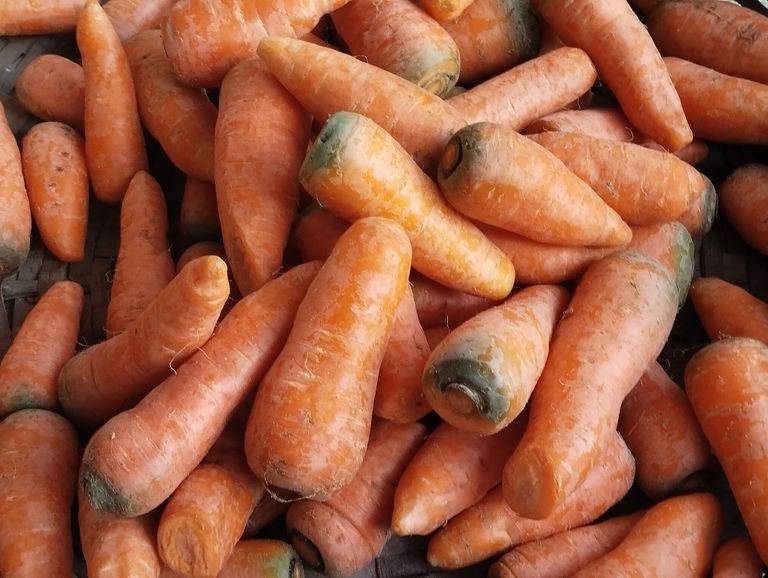
Health Benefits of Eating Carrots.
Carrots are a widely loved vegetable known for their vibrant orange color, crisp texture, and sweet taste. They are not only delicious but also packed with essential nutrients that offer numerous health benefits. Whether eaten raw, cooked, or juiced, carrots can be a valuable addition to a balanced diet. In this blog, we will explore the various health benefits of eating carrots and why you should make them a regular part of your meals.
- Rich in Nutrients and Antioxidants
Carrots are an excellent source of essential nutrients, including:
Vitamin A – Carrots are rich in beta-carotene, which the body converts into vitamin A. This nutrient is crucial for maintaining good vision, a strong immune system, and healthy skin.
Vitamin C – This vitamin helps boost immunity, promotes skin health, and acts as an antioxidant to fight free radicals.
Vitamin K1 – Supports blood clotting and bone health.
Potassium – Helps regulate blood pressure and supports heart health.
Fiber – Aids digestion and promotes gut health.
The presence of powerful antioxidants in carrots helps protect the body from oxidative stress, reducing the risk of chronic diseases.
- Improves Eye Health
One of the most well-known benefits of carrots is their ability to improve eye health. The high beta-carotene content in carrots is converted into vitamin A, which is essential for maintaining good vision. A deficiency in vitamin A can lead to night blindness and other vision problems.
Carrots also contain lutein and zeaxanthin, two antioxidants that help protect the eyes from age-related macular degeneration and cataracts. Regular consumption of carrots can support long-term eye health and prevent vision-related issues.
- Supports Heart Health
Eating carrots can be beneficial for heart health due to their high fiber, potassium, and antioxidant content. Fiber helps lower cholesterol levels by binding with bile acids and removing them from the body. This process prevents the liver from using cholesterol to produce more bile acids, ultimately reducing overall cholesterol levels.
Potassium in carrots helps regulate blood pressure by balancing sodium levels in the body. High potassium intake is associated with a lower risk of stroke and heart disease. The antioxidants in carrots also help reduce inflammation and prevent damage to blood vessels.
- Aids Digestion and Gut Health
Carrots are an excellent source of dietary fiber, which plays a crucial role in digestive health. Fiber adds bulk to stool, preventing constipation and promoting regular bowel movements. It also supports gut bacteria, which are essential for a healthy digestive system.
Consuming carrots regularly can help maintain a balanced gut microbiome, reducing the risk of digestive disorders such as irritable bowel syndrome (IBS) and bloating.
- Helps in Weight Management
If you're trying to manage your weight, carrots are an excellent food choice. They are low in calories but high in fiber, which helps keep you full for longer periods. This reduces overall calorie intake and prevents overeating.
Carrots can be eaten raw as a healthy snack or added to meals in various ways, making them a versatile option for those looking to maintain or lose weight.
- Boosts Immunity
The immune-boosting properties of carrots come from their rich vitamin C and antioxidant content. Vitamin C helps the body produce white blood cells, which are essential for fighting infections.
Beta-carotene also plays a role in strengthening the immune system by promoting healthy cell function. Eating carrots regularly can help the body ward off illnesses and infections more effectively.
- Promotes Healthy Skin
Carrots contribute to healthy, glowing skin due to their high vitamin A and antioxidant content. Vitamin A helps repair skin tissues, reduce acne, and keep the skin hydrated.
The antioxidants in carrots protect the skin from sun damage and premature aging by reducing oxidative stress. Carrot juice is often recommended as a natural remedy for improving skin tone and reducing blemishes.
- May Reduce Cancer Risk
Carrots contain powerful antioxidants such as beta-carotene, lutein, and polyacetylenes, which may help reduce the risk of certain cancers. Studies suggest that the compounds in carrots can slow down the growth of cancer cells and prevent DNA damage.
Carrots have been linked to a lower risk of lung, breast, and colon cancer. The presence of falcarinol, a natural pesticide found in carrots, has shown potential anti-cancer properties in research studies.
- Supports Brain Health and Cognitive Function
Carrots are beneficial for brain health due to their high antioxidant content, which helps reduce inflammation and protect brain cells from oxidative stress. Beta-carotene, in particular, has been linked to improved cognitive function and a reduced risk of neurodegenerative diseases such as Alzheimer’s.
Regular consumption of carrots can enhance memory, focus, and overall brain function, making them a great food for mental well-being.
- Regulates Blood Sugar Levels
Despite their natural sweetness, carrots have a low glycemic index (GI), which means they do not cause a rapid spike in blood sugar levels. This makes them a suitable vegetable for people with diabetes or those trying to manage blood sugar levels.
The fiber in carrots also helps slow down sugar absorption in the bloodstream, reducing the risk of insulin resistance and diabetes-related complications.
- Improves Dental Health
Chewing raw carrots helps clean teeth and gums by removing plaque buildup. They act as a natural toothbrush, stimulating saliva production, which helps neutralize acids in the mouth.
Carrots also contain antibacterial properties that help reduce the risk of cavities and gum disease. Including them in your diet can contribute to better oral health and fresher breath.
- Enhances Liver Detoxification
Carrots support liver health by aiding in the detoxification process. The high fiber content helps remove toxins and waste products from the body, promoting a healthy liver.
Beta-carotene and vitamin A in carrots also assist in reducing fat accumulation in the liver, which can help prevent fatty liver disease. Drinking carrot juice is a popular natural remedy for liver cleansing.
How to Include More Carrots in Your Diet
Incorporating carrots into your diet is easy and versatile. Here are some simple ways to enjoy them:
Raw Snacks – Eat carrot sticks with hummus or yogurt dip.
Salads – Add grated or sliced carrots to salads for extra crunch.
Soups and Stews – Include carrots in vegetable soups, stews, and curries.
Juices and Smoothies – Blend carrots with fruits and vegetables for a nutritious drink.
Roasted or Steamed – Roast or steam carrots for a flavorful and healthy side dish.
Stir-fries – Add carrots to stir-fried dishes for extra nutrition and color.
Carrots are a powerhouse of nutrition and provide numerous health benefits. From improving eye health and boosting immunity to supporting heart health and aiding digestion, this humble vegetable is a must-have in your diet. Whether eaten raw, cooked, or juiced, carrots can contribute to overall well-being and prevent various diseases.

Carrot Farming: A Complete Guide
Carrot farming is a profitable and rewarding agricultural venture. Carrots (Daucus carota) are rich in vitamins, minerals, and fiber, making them a staple in many diets worldwide. This guide covers everything you need to know about carrot cultivation, from selecting the right variety to harvesting and marketing.
- Choosing the Right Variety
Carrots come in different shapes, sizes, and colors. Some common varieties include:
Imperator – Long, slender carrots, ideal for commercial farming.
Nantes – Cylindrical, sweet, and tender, suitable for fresh consumption.
Danvers – Medium-sized, tapered, and great for heavy soils.
Chantenay – Short, stout, and ideal for rocky or clayey soils.
Purple, Yellow, and White Carrots – Specialty varieties with unique flavors and nutrients.
Choose a variety based on your soil type, climate, and market demand.
- Ideal Climate for Carrot Farming
Carrots thrive in cool and temperate climates. The ideal temperature range for germination is 10–25°C (50–77°F). Warmer temperatures can lead to poor root formation, while extreme cold can hinder growth.
Best Season for Planting
Temperate regions – Spring and fall are ideal.
Tropical regions – Plant in the cooler months to avoid extreme heat.
- Soil Preparation and Requirements
Carrots grow best in loose, well-drained, sandy loam soil with a pH between 6.0 and 6.8. Avoid heavy clay soils, as they can cause misshapen roots.
Soil Preparation Steps
- Plowing – Till the soil to a depth of 12-15 inches (30-40 cm) to loosen it.
- Adding Organic Matter – Mix compost or well-rotted manure to improve soil fertility.
- Leveling and Bed Preparation – Create raised beds to enhance drainage and root development.
- Seed Selection and Sowing
Carrots are grown from seeds, which should be fresh and disease-free.
Sowing Method
Seed Rate – Use 4–6 kg of seeds per hectare.
Spacing – Sow seeds 1 cm deep with rows spaced 20–30 cm apart.
Germination Time – Seeds take 7–14 days to germinate.
To ensure even distribution, mix seeds with sand before sowing.
- Irrigation and Water Management
Carrots need consistent moisture, especially during germination and early growth.
Watering Schedule
Immediately after sowing – Light irrigation to keep the soil moist.
Vegetative growth – Water every 3–4 days.
Maturity stage – Reduce watering to prevent cracking.
Avoid overwatering, as it can cause fungal diseases. Drip irrigation is ideal for water efficiency.
- Fertilizer and Nutrient Management
Carrots require balanced nutrition for optimal growth.
Fertilizer Application
Before sowing – Apply 20–25 tons of compost or farmyard manure per hectare.
At sowing – Apply 50 kg nitrogen (N), 80 kg phosphorus (P), and 100 kg potassium (K) per hectare.
After 4–6 weeks – Provide additional nitrogen to boost root development.
Excess nitrogen can lead to excessive foliage growth and poor root quality.
- Weed and Pest Management
Weed Control
Manual Weeding – Remove weeds 2–3 times during the early growth stage.
Mulching – Use organic mulch to suppress weed growth and retain moisture.
Common Pests and Diseases
Aphids – Suck plant sap, causing curled leaves. Use neem oil or insecticidal soap.
Carrot Rust Fly – Larvae damage roots. Use row covers to prevent infestation.
Fungal Diseases (Powdery Mildew, Alternaria Leaf Blight) – Avoid overhead watering and use fungicides if necessary.
- Harvesting and Post-Harvest Handling
Carrots take 70–120 days to mature, depending on the variety.
Signs of Maturity
Roots reach the desired size and color.
The top of the carrot is visible at the soil surface.
Leaves may start yellowing slightly.
Harvesting Method
Loosen soil with a fork before pulling out the carrots.
Handle gently to avoid bruising.
Post-Harvest Handling
Washing – Remove soil and dirt.
Sorting and Grading – Separate based on size and quality.
Storage – Keep in a cool, humid place at 0–4°C for longer shelf life.
- Marketing and Profitability
Carrots have high market demand, especially in supermarkets, restaurants, and export markets.
Selling Options
Local Markets – Direct sales to consumers or retailers.
Wholesale Markets – Bulk sales to suppliers and traders.
Processing Industry – Supplying for juice, baby food, or frozen carrot production.
Export Market – Requires high-quality, uniform-sized carrots.
- Common Challenges and Solutions
Carrot farming can be highly profitable if managed well. By selecting the right variety, maintaining proper soil conditions, and implementing good farming practices, you can achieve high yields and excellent quality. Whether growing for local markets or export, carrots remain a valuable crop for farmers worldwide.

Crispy Carrot Fry Recipe – A Delicious and Healthy Snack
Carrots are not just nutritious but also incredibly versatile. Whether you love them raw, steamed, or fried, carrots add a natural sweetness and vibrant color to any dish. Today, we’re sharing a simple yet flavorful Crispy Carrot Fry Recipe that is perfect as a snack, side dish, or even a crunchy topping for rice and curries.
Why You’ll Love This Recipe?
Easy to Make – Requires only a few ingredients and minimal preparation.
Healthy – Carrots are packed with vitamins, fiber, and antioxidants.
Crispy & Delicious – A perfect balance of crunch and spice.
Customizable – Adjust the spices according to your preference.
Ingredients
For the Carrot Fry:
2 large carrots – Thinly sliced or cut into matchsticks
3 tablespoons chickpea flour (besan)
2 tablespoons rice flour (for extra crispiness)
1 teaspoon red chili powder (adjust to taste)
½ teaspoon turmeric powder
½ teaspoon cumin powder
½ teaspoon coriander powder
½ teaspoon garam masala
Salt to taste
1 teaspoon lemon juice
2 tablespoons water (or as needed for coating)
Oil for frying
For Garnishing:
Chopped coriander leaves
Chaat masala (optional)
Lemon wedges
Instructions
Step 1: Prepare the Carrots
- Wash and peel the carrots.
- Slice them thinly or cut them into matchstick-sized strips for even frying.
- Pat them dry with a paper towel to remove excess moisture.
Step 2: Prepare the Batter
- In a mixing bowl, combine chickpea flour, rice flour, red chili powder, turmeric, cumin powder, coriander powder, garam masala, and salt.
- Add lemon juice and mix well.
- Slowly add water, little by little, and stir until you get a thick coating consistency. The batter should stick to the carrot pieces but not be too watery.
Step 3: Fry the Carrots
- Heat oil in a pan over medium heat.
- Once the oil is hot, dip the carrot pieces into the batter and drop them gently into the oil.
- Fry in small batches to avoid overcrowding.
- Fry until the carrots turn golden brown and crispy, stirring occasionally.
- Remove with a slotted spoon and drain excess oil on a paper towel.
Step 4: Garnish and Serve
- Sprinkle chaat masala and chopped coriander leaves for extra flavor.
- Serve hot with mint chutney or tomato ketchup.
- Enjoy your crispy carrot fry as a snack or a side dish!
Tips & Variations
Baking Option: If you prefer a healthier version, bake the coated carrots at 200°C (400°F) for 15-20 minutes, flipping halfway.
Air Frying: Air fry at 180°C (350°F) for 10-12 minutes, shaking the basket occasionally.
Extra Crunch: Adding a tablespoon of corn flour can make them even crispier.
Spice it Up: Try adding black pepper, chat masala, or garlic powder for more depth of flavor.
Serving Ideas: Pair with a cup of masala chai for a perfect evening snack.
Health Benefits of Carrots
Rich in Vitamin A – Good for eye health.
Loaded with Fiber – Aids digestion.
Boosts Immunity – Contains antioxidants and vitamin C.
Low in Calories – A great choice for weight management.
Final Thoughts
This crispy carrot fry recipe is simple, delicious, and perfect for any occasion. Whether you're serving it as a snack, a crunchy side dish, or a tea-time treat, it will surely be a hit! Try this recipe today and let us know how you liked it.

Crispy Carrot Fry Recipe – A Delicious and Healthy Snack
Carrots are not just nutritious but also incredibly versatile. Whether you love them raw, steamed, or fried, carrots add a natural sweetness and vibrant color to any dish. Today, we’re sharing a simple yet flavorful Crispy Carrot Fry Recipe that is perfect as a snack, side dish, or even a crunchy topping for rice and curries.
Why You’ll Love This Recipe?
Easy to Make – Requires only a few ingredients and minimal preparation.
Healthy – Carrots are packed with vitamins, fiber, and antioxidants.
Crispy & Delicious – A perfect balance of crunch and spice.
Customizable – Adjust the spices according to your preference.
Ingredients
For the Carrot Fry:
2 large carrots – Thinly sliced or cut into matchsticks
3 tablespoons chickpea flour (besan)
2 tablespoons rice flour (for extra crispiness)
1 teaspoon red chili powder (adjust to taste)
½ teaspoon turmeric powder
½ teaspoon cumin powder
½ teaspoon coriander powder
½ teaspoon garam masala
Salt to taste
1 teaspoon lemon juice
2 tablespoons water (or as needed for coating)
Oil for frying
For Garnishing:
Chopped coriander leaves
Chaat masala (optional)
Lemon wedges
Instructions
Step 1: Prepare the Carrots
- Wash and peel the carrots.
- Slice them thinly or cut them into matchstick-sized strips for even frying.
- Pat them dry with a paper towel to remove excess moisture.
Step 2: Prepare the Batter
- In a mixing bowl, combine chickpea flour, rice flour, red chili powder, turmeric, cumin powder, coriander powder, garam masala, and salt.
- Add lemon juice and mix well.
- Slowly add water, little by little, and stir until you get a thick coating consistency. The batter should stick to the carrot pieces but not be too watery.
Step 3: Fry the Carrots
- Heat oil in a pan over medium heat.
- Once the oil is hot, dip the carrot pieces into the batter and drop them gently into the oil.
- Fry in small batches to avoid overcrowding.
- Fry until the carrots turn golden brown and crispy, stirring occasionally.
- Remove with a slotted spoon and drain excess oil on a paper towel.
Step 4: Garnish and Serve
- Sprinkle chaat masala and chopped coriander leaves for extra flavor.
- Serve hot with mint chutney or tomato ketchup.
- Enjoy your crispy carrot fry as a snack or a side dish!
Tips & Variations
Baking Option: If you prefer a healthier version, bake the coated carrots at 200°C (400°F) for 15-20 minutes, flipping halfway.